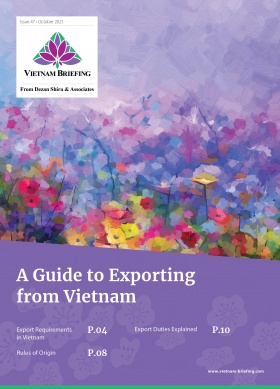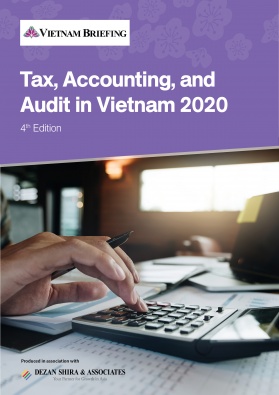Vietnam Issues Eligible Criteria, Incentives for SMEs: Decree 80
- Vietnam issued Decree 80 on defining what constitutes an SME as well as government support for SMEs.
- Decree 80 replaces Decree 39 and came into effect on October 15.
- Investors should seek the assistance of local advisers to better understand how they can benefit from these incentives.
The Vietnamese government issued Decree No 80/2021/ND-CP (Decree 80) guiding the implementation of the Law on Support for Small and Medium Enterprises (SMEs). Decree 80 came into effect on October 15 and replaces Decree 39.
Small and medium-sized enterprises continue to play a major role in Vietnam, accounting for 98 percent of all enterprises, 40 percent of GDP, and 50 percent of employment.
SME criteria
Decree 80 unveils several support measures for SMEs and as well as provides clear definitions for what is constituted as an SME:
The criteria for determining an SME is as follows:
Micro-enterprises
- For agriculture, forestry and fishery, and industry and construction industries:
- Have employees with an average of 10 people or less participating in annual social insurance;
- Total revenue for the year is not more than VND 3 billion (US$131,000) or total capital for the year is VND 3 billion (US$131,000) or less.
- For trade and services:
- Have employees with an average of 10 people or less participating in social insurance per year;
- Total revenue in a year is less than VND 10 billion (US$438,000) or total capital in a year is VND 3 billion (US$131,000) or less.
Small businesses
- For agriculture, forestry and fishery, and industry and construction industries:
- Have employees with an average of 100 people or less participating in social insurance;
- Total revenue in a year is VND 50 billion (US$2.2 million) or less, or total capital in a year is less than VND 20 billion (US$877,000) and is not a micro-enterprise.
- For trade and services
- Have employees with an average of 50 people or less participating in annual social insurance;
- Total revenue in a year is VND 100 billion (US$4.3 million) or less or total capital in a year is VND 50 billion (US$2.2 million) or less and is not a micro-enterprise.
Medium enterprises
- For agriculture, forestry and fishery, and industry and construction industries:
- Have employees with average of 200 people or less participating in annual social insurance;
- Total revenue in a year is VND 200 billion (US$8.7 million) or less or total capital in a year is VND 100 billion (US$4.3 million) or less, and is not a micro-enterprise.
- For trade and services:
- Have employees with an average of 100 people or less participating in annual social insurance;
- Total revenue in a year is VND 300 billion (US$13 million) or less of the total capital in a year is VND 100 billion (US$4.3 million) or less and is not a micro-enterprise.
Government support for SMEs
Decree 80 also provides government support for SMEs. These include but are not limited to:
- SMEs converted from household businesses are exempt from the license fee for three years from the date the enterprise registration certificate (ERC) is issued;
- For micro-enterprises – 100 percent of the consulting contract will be supported but not more than VND 50 million (US$2,000) per year;
- For micro-enterprises that employ female workers and that are social enterprises – a 100 percent of the consulting contract is supported but not more than VND 70 million (US$3,000) per year;
- For small businesses the government will support 50 percent of the contract value but not more than VND 100 million (US$4,300) per year;
- SMEs owned by women will be supported up to 50 percent of the contract value but not more than VND 150 million (US$6,500) per year;
- For medium enterprises, the government will support 30 percent of the contract value but not more than VND 150 million (US$6,500) per year;
- Medium enterprises owned by women are eligible for 50 percent of the contract value but not more than VND 200 million (US$8,700) a year; and
- 100 percent government support for SMEs in industrial clusters and value chains but not more than VND 30 million (US$1,300) a year.
- 100 percent government support on training courses for starting a business and up to 70 percent support of the total cost of business for SMEs.
In addition, SMEs can have free access to online lectures available with the Ministry of Planning and Investment (MPI) and local people committees.
SMEs play important role in Vietnam’s economy
Vietnam considers SMEs as an important driving force for its economy While concerns remain, the government introduced the Law on Support for Small and Medium Enterprises No 04/2017/QH14, which took effect in January 2018 and seeks to support SMEs. There are also several government, private-funded programs, and organizations lending support to SMEs.
Despite this, SMEs continue to face challenges due to unclear guidelines, vague supporting policies, and implementation of the laws by local authorities. To address this, the government has issued several regulations and circulars such as the new investment law, Circular 5, and Circular 6 to help support SMEs. The latest Decree 80 will further help SMEs gain access to government incentives, particularly after the fourth wave of the pandemic.
About Us
Vietnam Briefing is produced by Dezan Shira & Associates. The firm assists foreign investors throughout Asia from offices across the world, including in Hanoi, Ho Chi Minh City, and Da Nang. Readers may write to vietnam@dezshira.com for more support on doing business in Vietnam.
We also maintain offices or have alliance partners assisting foreign investors in Indonesia, India, Singapore, The Philippines, Malaysia, Thailand, Italy, Germany, and the United States, in addition to practices in Bangladesh and Russia.
- Previous Article A Guide to Exporting from Vietnam – Latest Issue of Vietnam Briefing Magazine
- Next Article Vietnam’s Business Recovery: 4 Industries to Watch







